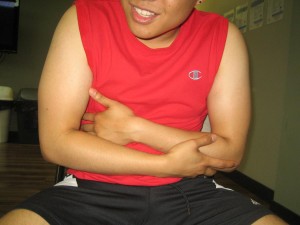Traveler’s diarrhea is a digestive tract disorder that causes loose stools and abdominal cramps. It is caused by eating contaminated food or beverages. When visiting a place where the climate, sanitary standards and social conditions are different from home, an individual faces an increased risk for developing traveler’s diarrhea.
Be careful on what to eat and drink while travelling in order to minimize the risk for traveler’s diarrhea. It is important to note that diarrhea can affect the health of many individuals in various parts of the world, especially when travelling to developing countries such as in Asia, South America, Southern Europe and Africa.

Diarrhea involves repeated bowel movement of unformed, watery stools as much as 3-10 times a day and accompanied by vomiting, gas, bloating and abdominal cramps. Traveler’s diarrhea can sometimes occur anytime while travelling and it can also happen after returning home. It depends on the type of organism involved and the incubation period.
Diarrhea can last for 2-4 days but can last for a week. Dehydration is one of the complications of diarrhea and sometimes there is blood and mucus found in the stools. In some cases, it can be caused by changes in the climate and water. Bacteria and virus can cause traveler’s diarrhea. Remember that traveler’s diarrhea is not a serious problem and the condition can subside after a few days.
Symptoms of traveler’s diarrhea
- An urgent need to defecate
- Abdominal cramps
- Sudden onset of passage of three or more loose stools in a day.
- Nausea and vomiting
- Fever
Causes of traveler’s diarrhea
- Traveler’s diarrhea is caused by E.coli and other bacteria that are found in the fecal matter.
- It can be transmitted by feco-oral route. It simply means eating food and drinking water which are contaminated with fecal matter.
- Viruses such as rotavirus can also cause traveler’s diarrhea. Young children are more susceptible to traveler’s diarrhea due to their explorative nature while eating.
- People who travel in places where there are poor sanitary facilities, those with poor hygiene practices and staying in overcrowded places are risk factors that can cause traveler’s diarrhea.
Treatment and home remedies for traveler’s diarrhea
- Drink plenty of water since fluids lost should be replenished. One way is by preparing an oral-rehydration solution at home. In a glass of water, mix a teaspoon of sugar and a pinch of salt and then add a few drops of lemon juice. Make sure to mix well and drink.
- Boil and cool the water before drinking it. An alternative is to use bottled water for drinking.
- Avoid drinking tea and coffee which increases dehydration.
- Drink buttermilk at least 2-3 times in a day since it contains healthy bacteria that can help eliminate the pathogens that causes the disease and helps maintain healthy intestinal flora.
- Eat bananas because it contains salts such as potassium and helps replenish salts that are lost during diarrhea. Eat overripe bananas if available.
- Drink rice water which is the water that is drained after cooking rice. It helps in binding watery stools and makes them solid. You can add sugar and salt to the rice water before drinking.
